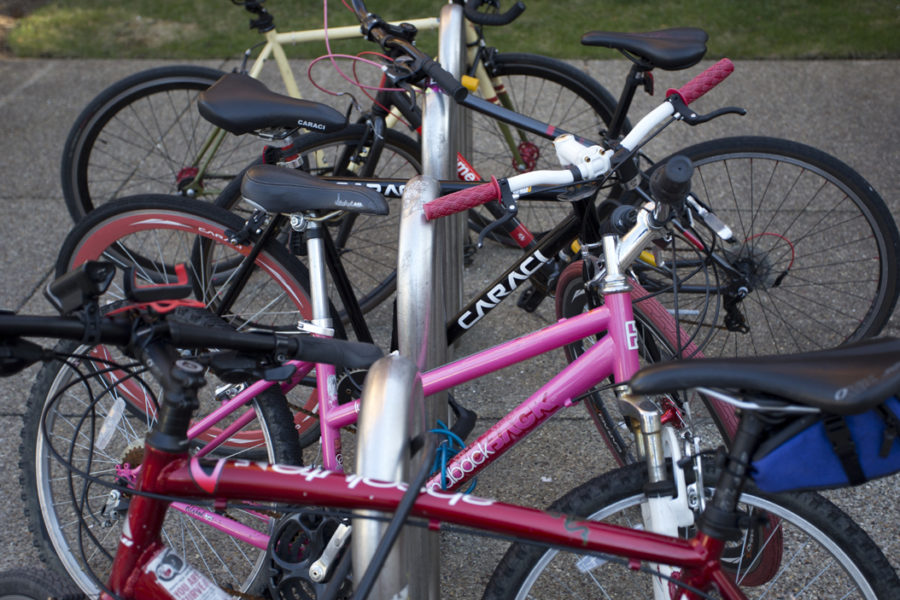After two years of racing and repairing bikes and a slew of leisurely Sunday brunch-and-rides, Kimmy Dinh and five of her friends decided to shift gears.
After Dinh, a senior biological science major, and her five cohorts — Sinjon Bartel, Hana Swift, Lora Matway, Ang Urban and Naomi Anderson — formed the Pitt Bicycle Collective in 2015, they decided to expand their impact on campus by developing a bike co-op this year. While there are other programs in the area, such as the Alley Bike Co-Op in East Liberty and Free Ride in the East End, there wasn’t one near to the University, Bartel said.
“While [Dinh] was really into those other models and realized the importance of their place in the community, she also became aware of how far away they were,” said the junior mechanical engineering student. “We want to give people the confidence to navigate places in a sustainable and self-dependent way.”
Dinh and other Bike Collective members have been working on funding, advertising and finding space since November 2016. The group received about $2,106 from the Pitt Green Fund, $1,052 from Student Government Board and a guaranteed yearly expense of $5,600 from Intramurals and Recreation this fall to provide bike repair tools for community cyclists and host informational sessions about riding techniques and safety.
The Collective currently meets in the William Pitt Union the first Thursday of every month to plan organized group rides and provide pop-up repair services for students’ bikes.
The repair shops generally “pop up” twice a semester in front of the William Pitt Union or between Wesley W. Posvar Hall and Hillman Library.
“The repair shop aspect makes you more confident as a biker,” said Hana Swift, a junior studio arts and art history major and member of the Collective. “Pittsburgh has been trying to develop a lot of safer bike policies. But if you’re more confident as a rider, that’s going to help make the streets safer,” Swift said.
Most of the employees and volunteers at the Bike Cave, the name for the co-op space, come from the Bike Collective.
Located in a former locker under the Posvar pass-through, The Bike Cave will store tools and supplies for student bike repair access, and employees will respond to any questions that students have about maintenance, riding trips and biking in general.
Employees will work at the Bike Cave for four hours a night, three nights a week, with additional shop hours supported by volunteers.
Aside from monetary support from Intramurals and Recreation and SGB, the Collective also won $10,000 at Pitt’s Sustainable Solutions competition Feb. 7, to continue founding the co-op.
Sam Vescovi, assistant director of operations for the Department of Campus Recreation, agreed for the department to fund two student worker positions at the co-op, as well as all recurring expenses like brake pads and grease tools for the Bike Cave. Vescovi was motivated by the realization that there aren’t many bike repair shops close to campus.
“Most of the repair shops are located in East End neighborhoods and aren’t as accessible for many of our students,” Vescovi said. “The bike co-op will offer that opportunity to more of our students who may not have had the notion to travel to Free Ride or another location.”
Community and social involvement is another essential piece of the co-op mission. The Collective hosts breakfast and brunch rides every Sunday, and will partner with WPTS Radio in the future for its Radio Ride, which combines bike riding with charity.
While the co-op will meet many functional needs of cyclists in the Pitt community, it will also operate with the intention of making the biking scene safer for women and queer people, according to Bartel.
“Oftentimes, the bike scene is dominated by men,” Bartel said.
According to Dinh, it doesn’t make sense that ads and commercials sell the image of a “hip white dude on a bike” since low-income individuals and people of color use biking as a means of transportation more often.
“It’s very intimidating for people to feel like they are a part of it — even if they do ride bikes — if they’re not white cis men,” Dinh said.
The Bike Collective hosted a Women and Queer Night bike ride at Free Ride on Nov. 23.
The co-op is forming in the midst of what some might dub a cyclist movement in Pittsburgh, where bike lanes are prominent in some neighborhoods and completely nonexistent in others. A steady increase in bike fatalities over the years has motivated the Oakland community’s push for wider bike lanes. Pittsburgh Mayor Bill Peduto has even advocated for more bike lane installation as an improvement on safety and economics in the long term.
Some community members disagree with this solution — believing that attention needs to be placed on speed control, a more immediate fix to the safety issues that occur from biking in Pittsburgh.
The most recent bike fatality on campus was in October 2015 when Susan Hicks, a long-time Pitt professor, died after she was fatally hit at the intersection of Bellefield and Forbes avenues while riding her bike.
Although several efforts have since been made to monitor driver-biker dynamics and create safer pathways of transportation — such as bike lanes and wider crosswalks — many people still do not feel comfortable coming to Oakland to bike.
“There’s a stigma that biking in Oakland isn’t very safe,” Sidney Ovial, a Pitt senior finance and business information systems major and the coordinator of the Pitt Green Fund, said.
Although there is still work to be done, the Pitt Bicycle Collective is making strides to develop a recreational and social foundation here at Pitt.
“With cycling, there’s a built-in community that comes with traveling by bike,” Bartel said. “As you ride more and more, you come to see that it’s a more engaging way to get around; you can identify with and connect more with people. That’s what gets me super excited about biking.”


